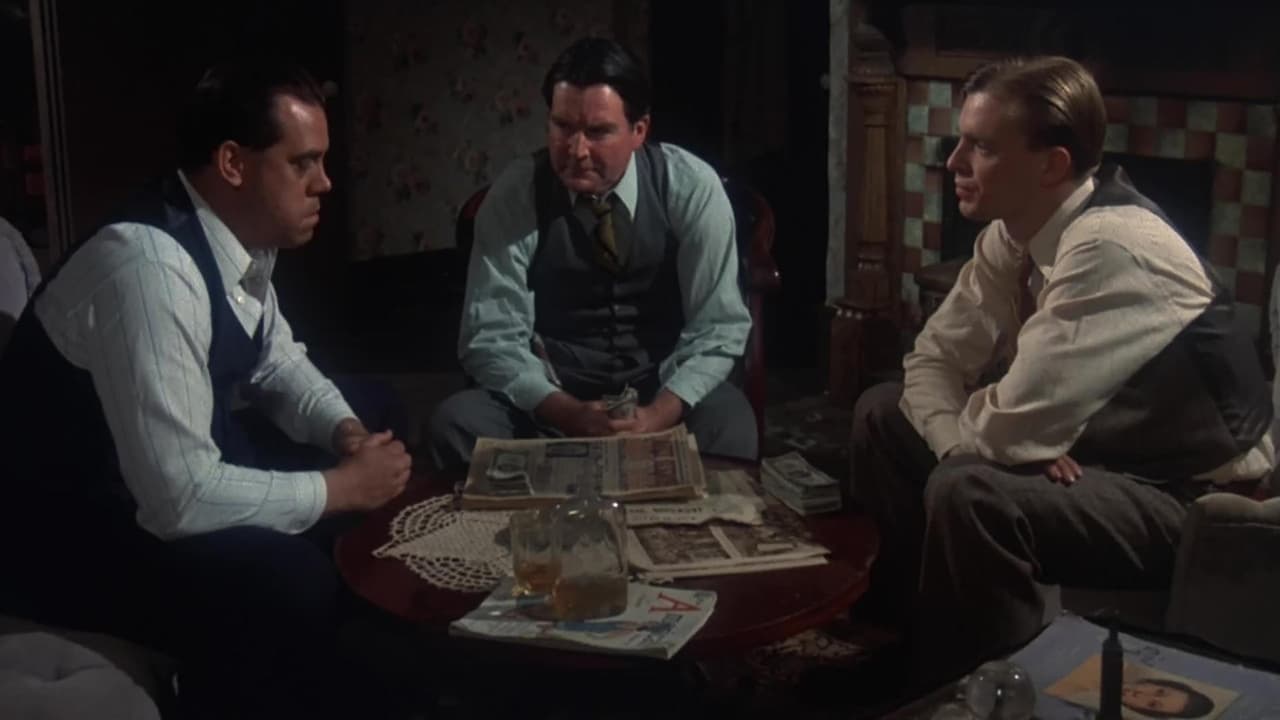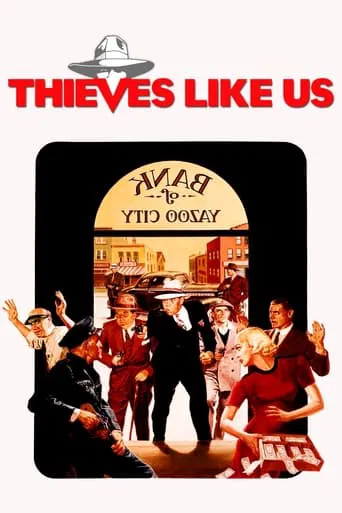



I think this is a new genre that they're all sort of working their way through it and haven't got all the kinks worked out yet but it's a genre that works for me.
View MoreMost undeservingly overhyped movie of all time??
I didn’t really have many expectations going into the movie (good or bad), but I actually really enjoyed it. I really liked the characters and the banter between them.
View MoreMostly, the movie is committed to the value of a good time.
View MoreFilm-history does not know any actress with looks, comparable to those of Shelley Duvall. Her performances of good-hearted, uncomplicated women, simple but not stupid, have become Duvall's trademark, Her unique face & body-moving add at least 10% extra to each film she is in. Although 'Thieves like us' isn't Duvall's most famous production, it surely provides a setting that suits her talents excellently. Here we really touch on the best 'Thieves like us' has to offer: a magnificent picturing of the countryside in the state of Mississipi in the 1930s. Positively accentuated by the use of radio-broadcasts from those days.'Thieves like us' dates from 1974. Watching it still provides you with a two hour experience, considerably up-valued by Shelley Duvall's performance. An experience that has in no way been dented by the passing of time. And probably won't be in the next 100 years to come.
View MoreRobert Altman was a busy boy in the early '70s, gleefully destroying the mythology of cherished genres with the enthusiasm of a little kid with a toy hammer. When he made a Western (McCabe & Mrs. Miller), his hero was a bearded pimp wandering a snow-covered land of Leonard Cohen songs and near-inaudible dialogue. When he turned his hand to film noir (The Long Goodbye), it was to introduce a scruffy, shambling Philip Marlowe whose messy hair matched his messy mind - and who couldn't even con his cat into eating an inferior brand of food. Thieves Like Us, released the next year, was something of a departure: less doggedly contrarian, with its aspects of realism allied to a certain heightenedness in style and atmosphere that smelled like folklore-fashioning.The film is an adaptation of a 1937 Edward Anderson novel, filmed previously in 1949 as They Live by Night, director Nicholas Ray's brilliant debut and one of the most vivid evocations of young love - and Depression-era desperation - ever put on film. While the first movie made excuses for its desperate protagonist (Farley Granger), here murderer Keith Carradine has no regrets (except that he's never pitched pro-ball) and no intention of leaving behind his life of crime with two older desperadoes, despite having found love. This is a tougher film to fall for, then, but an easy one to admire.Beginning with a shot of chain-gang convicts rumbling past on the rails, Altman effortlessly conjures a world of poverty, dirt and hopeless aspiration, shoving bottles of Coke into every scene and soundtracking his film with almost ever-present radios, playing light entertainment shows, crime serials, news broadcasts and political speeches. Occasionally it's too heavy-handed (the Romeo and Juliet sex scene, with its repetitive refrain), but more often it's perfectly-judged. The film follows the trio from the aftermath of their prison escape to their bullet-riddled fate, contrasting their presentation in the press with the less exciting, but more intriguing reality. In the midst of all that, there's time for numerous superb vignettes (the '36th robbery' being the highlight) and a touching romance between Carradine and gas-station attendant's daughter Shelley Duvall.For those who only know Duvall as the perpetually-screaming would-be-victim of a large portion of ham (Jack Nicholson) in Kubrick's The Shining - which I seem to be alone in thinking is actually quite a poor film - this should be something of an eye-opener. For the first seven years of her career, Duvall appeared only in the films of Altman, evincing a rare kind of magic in her rich and sensitive characterisations. She's wonderful again here: needy, adoring and appealing. Her defining moment is a scene where a lesser performer could have blown it all, as she shifts from scorned fury ("You lied. Liar!") to longing and a desire for affirmation, cradling Carradine's head as he sits motionless on the bed. Carradine himself has been lacklustre more often than he's been impressive, but he did some of his best work for Altman (most notably in the following year's Nashville) and is extremely effective in a role that suits him well. John Schuck and Bert Remsen also do strong work as his partners in crime, though the pick of the supporting cast is Louise Fletcher (One Flew Over's Nurse Ratched), excellent as a put-upon relation sheltering the titular thieves.In many ways, Altman was the key American director of the period, the one who both created and seized upon the unique opportunities of the period, realising the zeitgeist and pioneering its most important innovations, like overlapping dialogue and labyrinthine, novelistic narratives. Co-scripting here, he nails the period and the significance of this story, while throwing in some left-field touches that you'd swear were Coen brothers originals, leaving much of the main action sequences off the screen, and showing the crooks drawing straws to see who drives the getaway car... then deciding that's not going to work. It's a completely different take on Anderson's novel than They Live by Night, but just as incisive, rewarding and memorable.
View MoreI miss Altman. I miss the feeling of ease he allows.Some films are work. Some aren't worth it, while you do all sorts of conceptual shuffling to follow whatever structure the filmmaker designs. Or in the worst case which has not been consciously designed so needs to be mastered without help.But Altman doesn't create crystals with edges. He does not refract great truths. He simply observes. By this film, his technique of discovery is in full bloom. He never storyboarded or blocked a scene. He did not tell an actor where to go or look. He simply trusted the actors to inhabit their characters and trusted the camera to find them. The minimum was manufactured. This is dogma film-making before the oddly formed rigors of dogma were proposed to "free" cinema.What is remarkable about this film is not simply the flow of the images and narrative, but that of the sound. "McCabe" was, I think, his first serious work in understanding how sound can bleed. Later, he (and Malick) would explore other effective techniques of soundweaving. Here, we have a simple but very effective device. Most of the narrative comes not from what you see or are told. We hear the radio. We hear it when there is a radio turned on in the world we are watching. But we also hear it when our characters leave the world of repose and go do something. That something has a radio show — usually a crime drama — overlain. The immediate effect is that these guys are not robbing because they need money, or for some philosophical purpose. It is because it gives them identity, and that identity is defined here by radio. Just as the radio allows the imposition of identity on those we watch, the idea is that what we watch similarly imposes on us. Much of what we see the characters do is measure how effective their adoption of character is. "Bonnie and Clyde" was something notable among Hollywood films in 67. It advanced this notion a tiny bit, using a French film vocabulary. It will be hard to recognize that today because the French derived from Hollywood. Altman does a B&C that lasts, because his vocabulary is wholly original, discovered and adopted, not engineered.Ted's Evaluation -- 3 of 3: Worth watching.
View MoreDrama about three Depression era crooks--Bowie (David Carradine), Chicamaw (John Schuck) and T-Dub (Bert Remsen). Two have just escaped from prison. They get together and rob banks. Bowie meets Keechie (Shelley Duvall) and starts to fall in love with her. But can he be with her and give up crime? I can't say this was entertaining and it is slow and leisurely paced but I found it just fascinating. I'd have to say this film was naturalistic--everything seemed real and true to life. The cinematography was absolutely stunning in this one--the lush green backgrounds were absolutely breath-taking. The period cars they got were also great in this--big beautiful automobiles in bright vivid colors. The towns they shot in were small rural towns in Mississippi that looked like they were still in the 1930s. It's incredible that director Robert Altman was able to find towns like that in 1974 and he used them to great effect. Also there's no music--only recordings of actual radio shows from that era. They work perfectly and compliment the action on the screen. Everything is done on a laid back, easy-going level. Even the one bank robbery they show is done in a quiet easy manner! All the direction is great...but that goes without saying for an Altman film.The acting is great. Carradine and Duvall are fascinating--so young and full of life. They play off each other well and their conversations were just incredible. Schuck was downright terrifying as the unstable Chicamaw. Remsen was just OK as T-Dub. Also Louise Fletcher in her first role was just great. Altman discovered her for this movie--she was (at the time) married to someone in the crew.This is not for everyone--but then most Altman films aren't. This is for those who prefer quiet intelligent movies. My only complaint--we see characters constantly drinking Coca-Cola. This was true to the era but it started to seem like product placement (it wasn't). Not Altman's best (I still think "Nashville" was better) but well worth catching. A 9.
View More